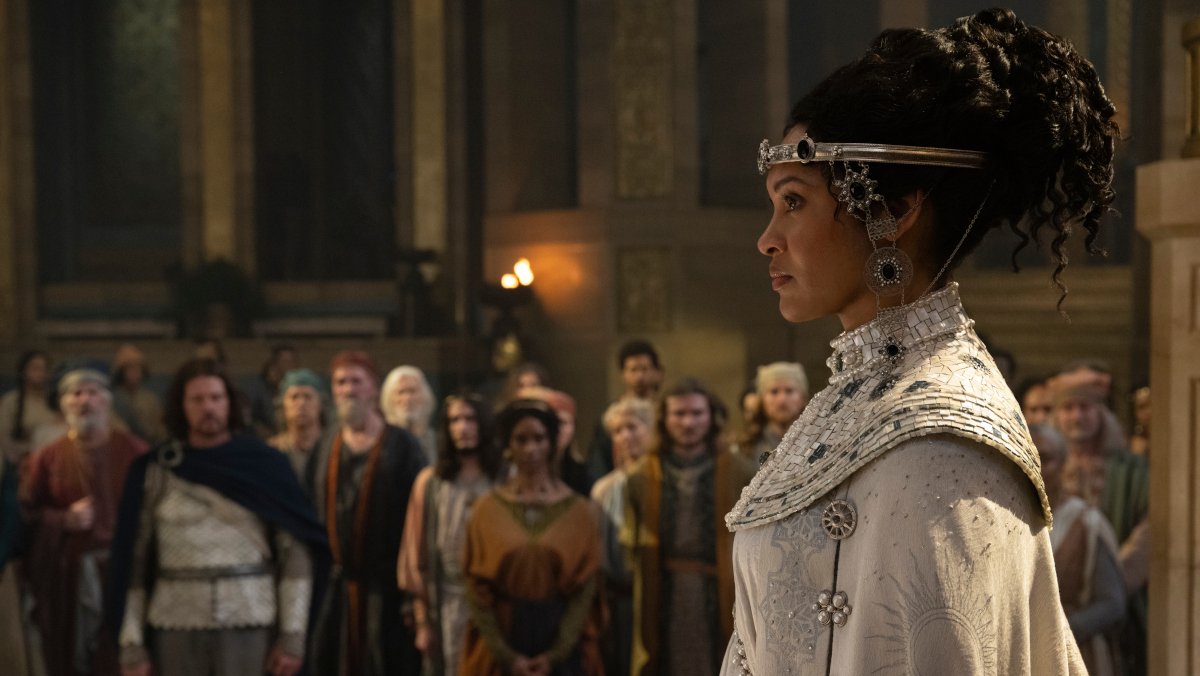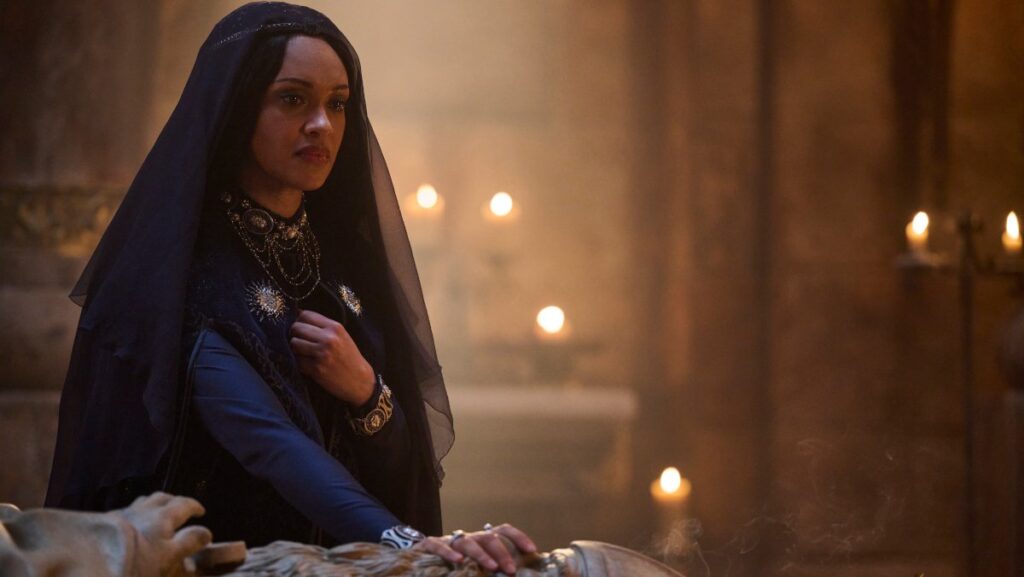Queen Regent Mìriel chose to follow Galadriel across the sea to Middle-earth in season one of The Lord of the Rings: The Rings of Power. She led her people from Númenor to the Southlands, right into a war. Things did not go in their favor, and especially not in Mìriel’s favor. When Nerdist visited The Rings of Power season two set with a small group of reporters, we talked with Cynthia Addai-Robinson about what’s ahead for Mìriel and her kingdom.
When season two begins, how is Mìriel processing everything that happened?
Cynthia Addai-Robinson: Where do I even begin? At the end of season one, we find Mìriel in a very vulnerable position. Not only has she lost her sight, she has been defeated in battle. Many Númenórean lives were lost. Her father, the king, has passed. That’s a lot to end on. So really, season two, specifically to Mìriel and Númenor, is trying to find strength in loss. There are a lot of implications for how people feel around her taking Númenóreans into battle.
In season one, we were already starting to see divisions in [Númenórean] society. There’s a deepening of that as we continue into season two—so lots of very dramatic things. And on top of that, in season one we see Queen Regent Mìriel. It stands to reason that with the king’s passing there would be a progression of things.
What are the challenges of building and playing a character when you and the audience know the journey?
Addai-Robinson: Obviously, the meatiest roles allow you to demonstrate vulnerability and strength simultaneously. You welcome the challenge and obviously you want to give it something that feels relatable. Here we are in this fantastical Middle-earth, but a lot of the things that Mìriel is navigating, or any character in a giant genre story navigates, are things that are understandable. The passing of a loved one, civil strife—things that I think are particularly resonant right now.
It’s also a place to think on these things for myself, just as a human being. It’s a place to put those feelings. Certainly when I first started on this journey as the character of Mìriel in the midst of lockdown and an ever-changing world, it was a place that felt safe for me because I just had a swirling storm of thoughts and feelings on any given day. But what I really appreciate and love about Mìriel is that sense of integrity and strength. She’s a moral compass for her people. At the end of the day, the decisions that she’s navigating are bigger than her. It’s really about guiding her people and trying to make the best decisions and choices for society, not just for herself.
Was there anything you learned from season one that you wanted to carry with you into season two?
Addai-Robinson: Once you’ve got a first season of a series under your belt, you’ve had a lot of intensive time spent with a character, spent in a world, spent with your fellow characters and castmates. You want to approach a season two and beyond trusting in all of those things. We put a lot of work and thought and heart into making sure that we were representing this story in the most honest way that we could. A lot of us have ownership over these characters. We feel a sense of protecting them and shepherding them, not just through the story, but just out there in the world.

Mìriel developed what seemed like a friendship with Elendil in season one. What can you share about their relationship in season two?
Addai-Robinson: You’re going to see a continuation of this dynamic of two people who have both experienced profound loss and are now trying to really have that sense of, “Let us not have this loss be in vain.” It’s really an exploration of, I would say, their worldview within Middle-earth. As they’re returning to Númenor with those divisions in society and those differing worldviews, you’re going to see how the second season navigates that.
For the two of them specifically, it’s a dynamic that my lovely dear Lloyd Owen and I have enjoyed exploring. We really wanted to make sure that with these two characters, that their relationship from where it starts in season one, very unsuspectingly, and how it continues to progress through the second season, that there really is a change. These people are forever changed by their circumstances.
How did Mìriel losing her sight affect the physicality of your performance in season two?
Addai-Robinson: I was told early on that this would be something that happens to Mìriel. And in fact, I started my first day with one of the scenes where I was already blind. So it was an interesting way of working where I had to start with some of those scenes, then I jumped back to the beginning, and then jumped back to working with the blind element. The difference now is she has acclimated to this situation. There’s this sense of not wanting to have this be something that people can perceive as a weakness in her ability to lead, that there is an awareness as a leader that there’s a perception of conveying strength and representing that for your people, for society.
At the end of season one, you see Elendil and Mìriel and he’s still going to be at her side. Ultimately it’s an exploration of working with someone where it isn’t about depending on them, but they both need each other in this moment to help each other see figuratively and literally. That’s a really interesting and beautiful thing that we get to further explore as the season goes on.
But in terms of the physicality of it and returning to that place, I was mindful of, at this point, she has made it her mission to learn to move through the world in a new way. So, it isn’t about struggling through that so much as acclimating to it, if you know what I mean. That was probably true for me as well.
The Lord of the Rings: The Rings of Power season two premieres with three episodes on Prime Video on August 29.



